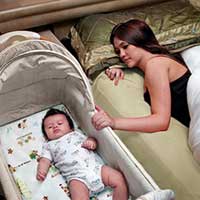Many new mothers do not receive advice from physicians on aspects of infant care such as sleep position, breastfeeding, immunization and pacifier use, according to a study funded by the National Institutes of Health.
Health care practitioner groups have issued recommendations and guidelines on all these aspects of infant care, based on research which has found that certain practices can prevent disease and even save lives.
The study authors surveyed a nationally representative sample of more than 1,000 new mothers, inquiring about infant care advice they received from doctors, nurses, family members and the news media.
Roughly 20 percent of mothers said they did not receive advice from their doctors regarding current recommendations on breastfeeding or on placing infants to sleep on their backs — a practice long proven to reduce the risk of sudden infant death syndrome (SIDS).
More than 50 percent of mothers reported they received no advice on where their infants should sleep. Room-sharing with parents — but not bed-sharing — is the recommended practice for safe infant sleep.
The study appeared in Pediatrics and was conducted by researchers at Boston Medical Center, Boston University, and Yale University, New Haven, Connecticut.
Infant Care Tips :
Safe infant sleep environment :
Infants should be placed to sleep alone, on their backs, on a firm sleep surface, such as in a mattress in a safety-approved crib, covered by a fitted sheet.
Soft objects, toys, crib bumpers, quilts, comforters and loose bedding should be kept out of the baby’s sleep area.
Room sharing :
Keeping the infant’s sleep area in the same room and next to where the caregiver sleeps — is recommended as a way to reduce the risk of SIDS and other sleep-related causes of infant death.
Infants should not sleep in an adult bed, on a couch, or on a chair alone, with the parent or caregiver, with siblings or other small children, or with anyone else.
Why breastfeeding is important :
Every woman’s journey to motherhood is different, but one of the first decisions a new mom makes is how to feed her child.
When you choose to breastfeed, you make an investment in your baby’s future. Breastfeeding allows you to make the food that is perfect for your baby. Your milk gives your baby the healthy start that will last a lifetime.
Breastfeeding also:
- Protects your baby
- Benefits your health
- May make your life easier
- Benefits society
Why should infants and young children be vaccinated?
Infants are particularly vulnerable to infectious diseases; that is why it is critical to protect them through immunization. Each day, nearly 12,000 babies are born in the United States who will need to be immunized before age two against 14 vaccine-preventable diseases. Immunizations help prevent the spread of disease and protect infants and toddlers against dangerous complications.
Immunization is one of the most important things a parent can do to protect their children’s health. Today we can protect children from 14 serious diseases. Failure to vaccinate may mean putting children at risk for serious diseases.
Source: National Institutes of Health, USA

